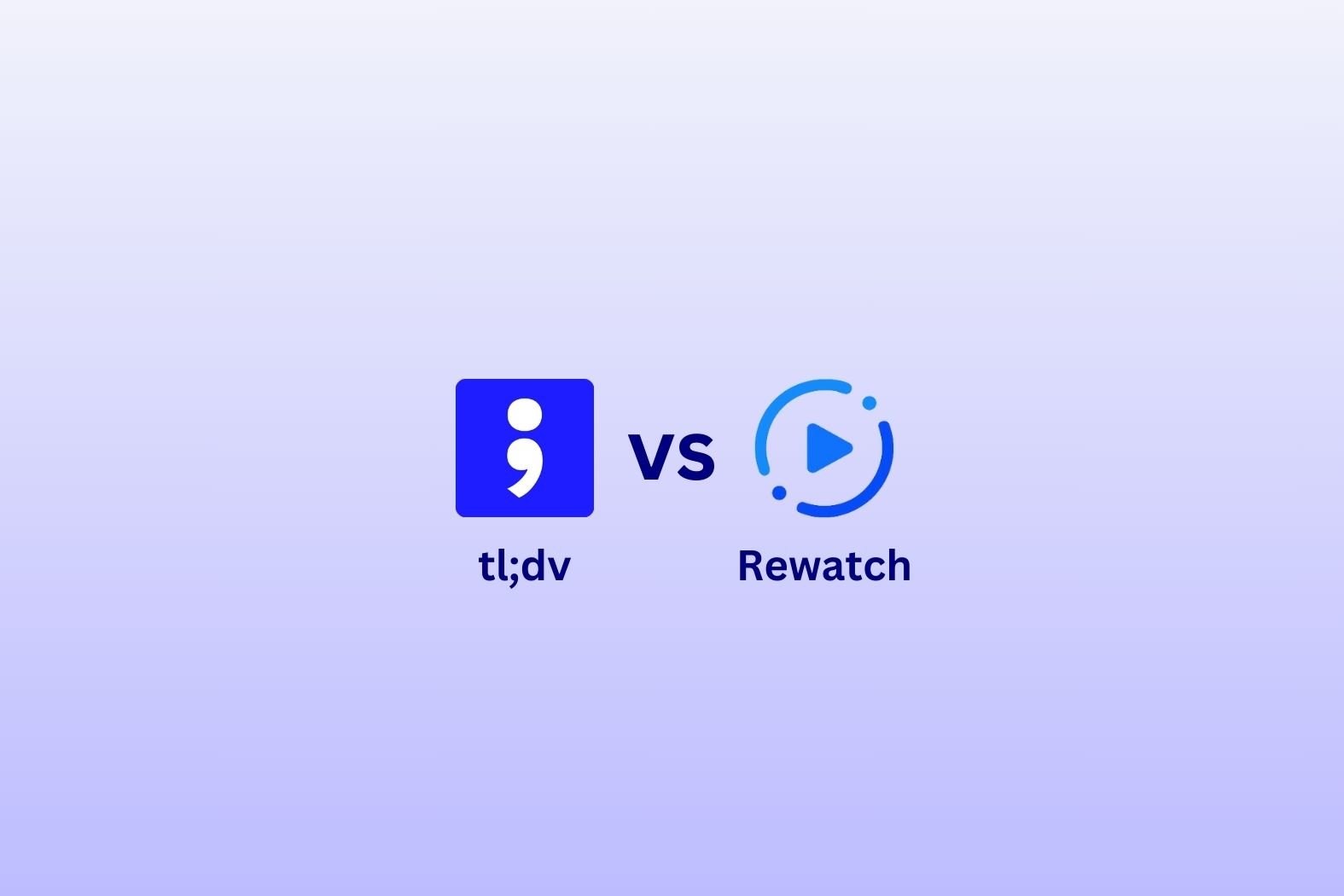This is it: tl;dv vs Rewatch. If you’re a Rewatch customer, you’re likely wondering where to go to after Atlassian announced they’re sunsetting the Rewatch platform and integrating it into Loom.
We believe tl;dv is a strong contender and want to make your time worth it with a no bull comparison, worthy of your time.
This comprehensive comparison will break down 12 fundamental categories and compare both tools’ features for each one. By the end, you should have a greater understanding of which tool will fit seamlessly into your current tech stack and understand whether tl;dv is a valid option on the table.
tl;dr
| tl;dv | Rewatch | |
|---|---|---|
| Transcription | 19 🟢 | 18 |
| Recording | 20 🟢 | 14 |
| Conversational Intelligence | 14 🟢 | 8 |
| Automation & Integrations | 9 🟢 | 8 |
| Note-taking | 12 🟢 | 8 |
| Security | 19 🟢 | 7 |
| Coaching | 8 🟢 | 0 |
| Admin | 8 🟢 | 6 |
| Organizational | 12 | 12 |
| Support | 4 🟢 | 3 |
| Revenue Intelligence | 0 | 0 |
| Other | 6 🟢 | 2 |
| Total | 131 🟢 | 86 |
As you can see from the table above, tl;dv comes out on top with a whopping 131 points compared to Rewatch’s 86.
While Rewatch was able to draw level on the organizational front, and come close with transcription and automation capabilities, it ultimately drifted further and further behind as the comparison went on.
tl;dv’s stand-out multi-meeting intelligence was one of the defining factors in the tl;dv vs Rewatch battle. This feature enables users to get AI insights across multiple meetings at once, helping them identify trends and patterns. This can even be scheduled regularly about any topic from any set of meetings you desire.
Rewatch’s AI wasn’t up to scratch in comparison. It also fails to offer any dedicated sales features, unlike tl;dv that features a wide range of playbook options, as well as objection handling tips and a speech analytics dashboard.
Rewatch does have some promising features however. The Enterprise level support features a dedicated support rep for your business which is a nice personalized touch. They are SOC2 compliant and have all their integrations available, including CRMs, on the free plan. They also have a great custom vocabulary feature so you can include jargon and industry terminologies in your transcripts.
Let’s dive a little deeper into this comparison.
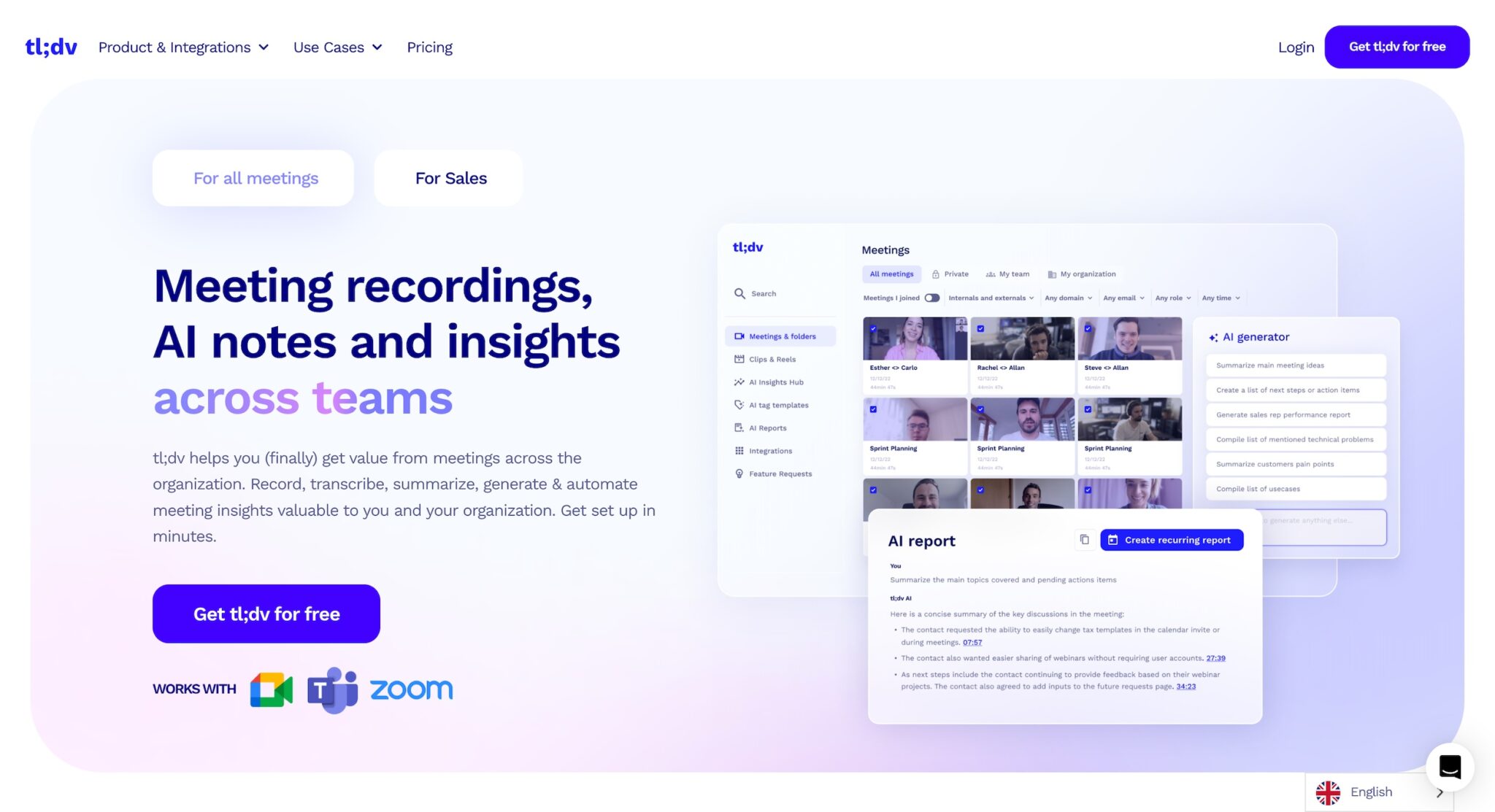
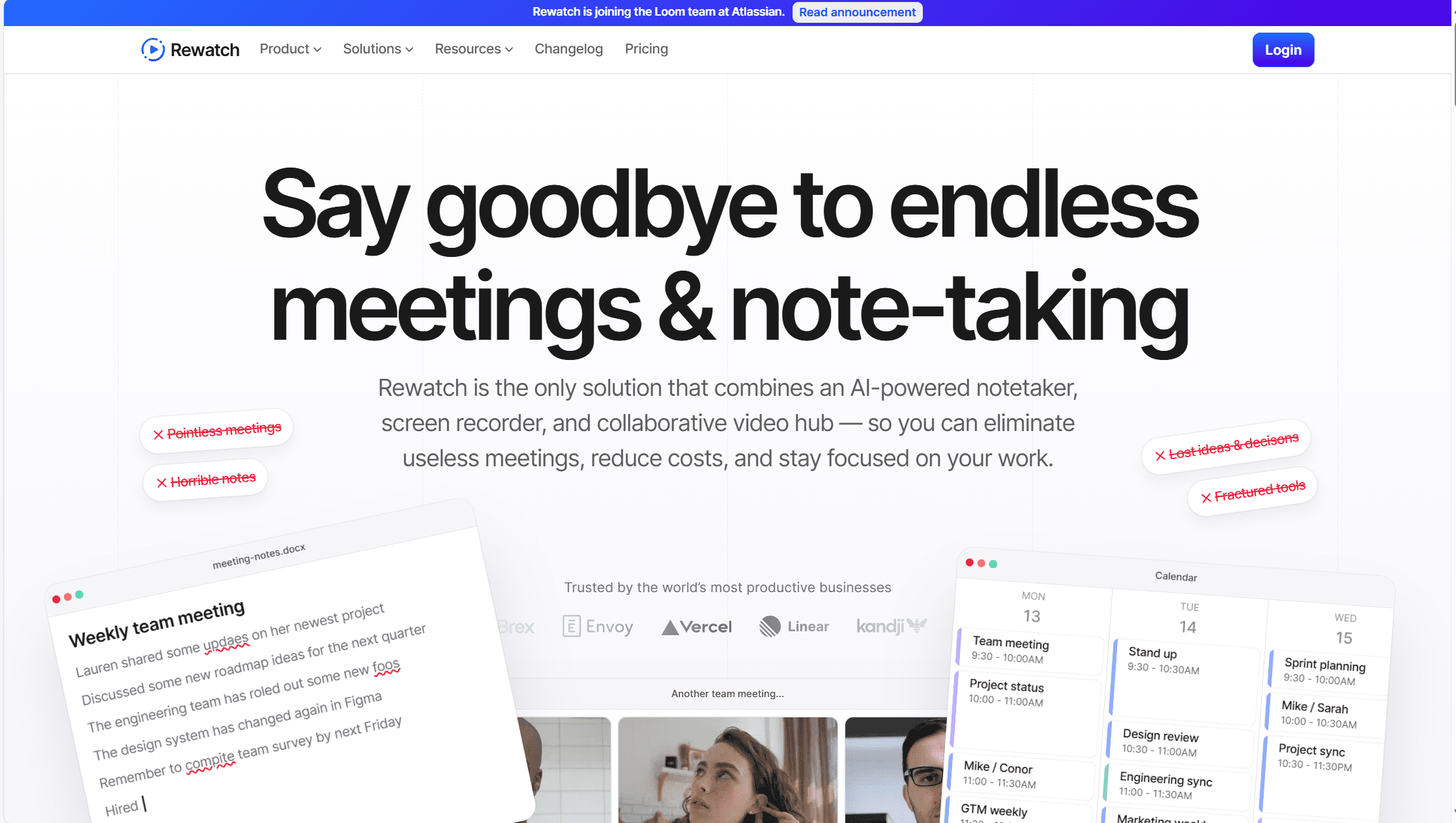
tl;dv vs Rewatch: 12 Factors to Consider While Choosing the Best AI Notetaker
How do we rank?
- We give 2 points to a platform once it is the clear winner or when the capability is equally met by the other.
- We give 1 point when the capability is present, but it’s not a winner.
- We give 0 points when the capability is not present.
Transcription Capabilities
| tl;dv (19) | Rewatch (18) | |
|---|---|---|
| Transcriptions included | 🟢 Unlimited | 🟠 15 free |
| Real-time transcriptions | 🔴 | 🔴 |
| Languages supported | 🟢 +40 | 🟠 30 |
| Dialects supported | 🟢 | 🔴 |
| Filler word removal | 🔴 soon | 🔴 |
| Speaker recognition | 🟢 | 🟢 |
| Speaker names | 🟢 | 🟢 |
| Transcribe video/audio uploads | 🟠 5 per month free | 🟢 15 per month free |
| Export transcripts | 🟢 | 🟢 |
| Clips from transcript | 🟢 | 🟢 |
| Custom vocabulary | 🔴 soon | 🟢 |
| Full-Transcript search | 🟢 | 🟢 |
| Edit transcription | 🟢 | 🟢 |
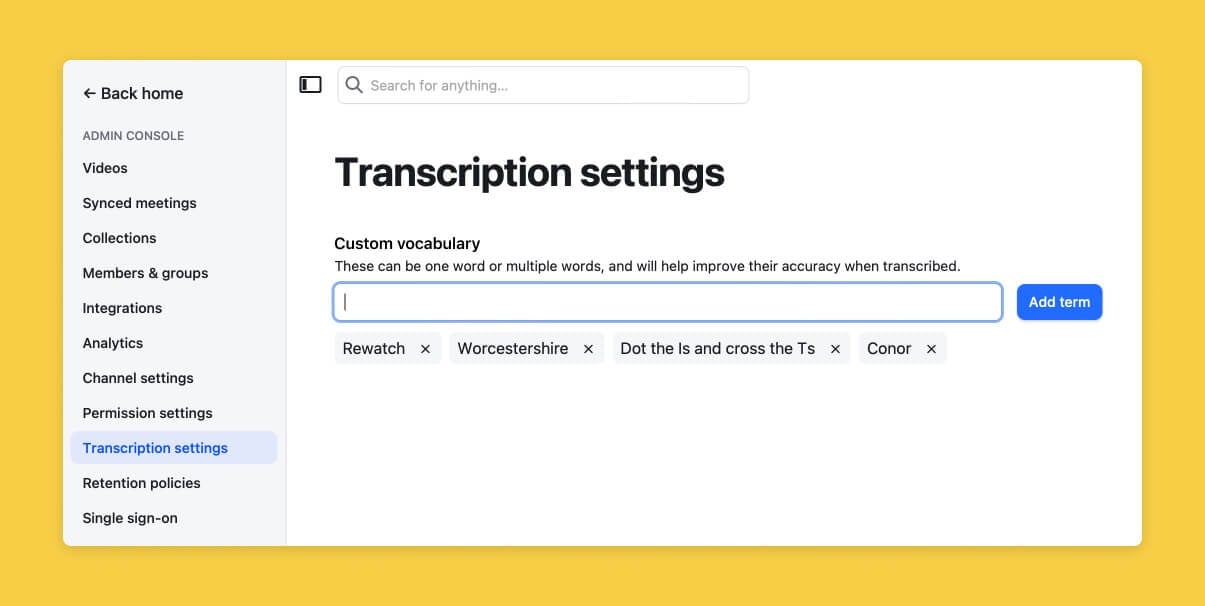
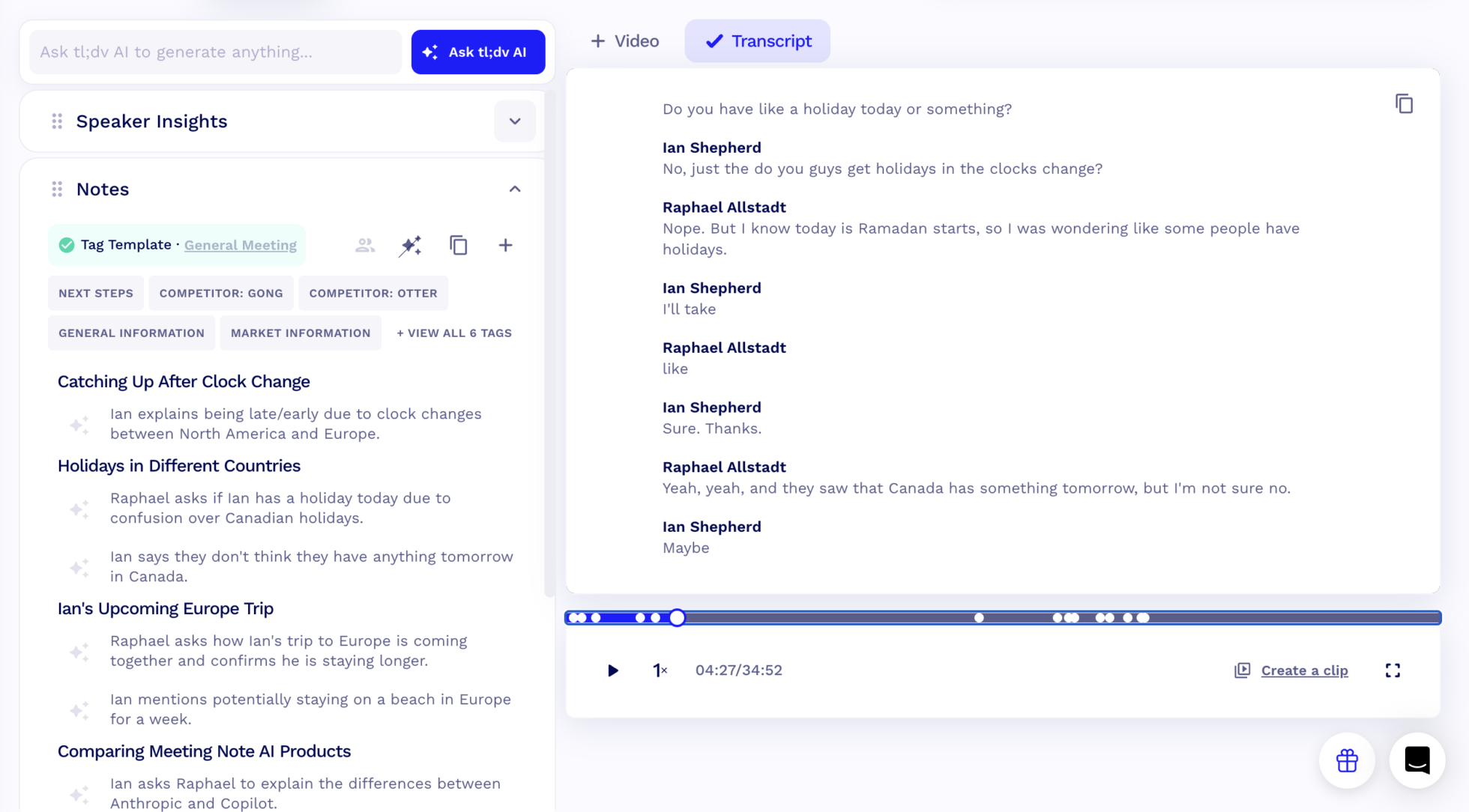
Transcriptions Included
tl;dv provides unlimited call recordings and transcriptions completely free of charge. Rewatch, on the other hand, only allows users to transcribe 15 meetings per month on the free plan. While this is enough to try the tool out, it certainly puts a limit on how much you can get a feel for the tool before you’re forced into a purchasing decision.
Real-time Transcriptions
Neither tl;dv nor Rewatch offer real-time transcriptions, highlighting a key drawback for both platforms for users who prioritize instant transcription access.
Languages Supported
tl;dv supports transcription in over 40 languages, providing a broad linguistic range that caters to global teams and multilingual environments. Transcript translations can be done on the free plan.
Rewatch only provides translations in 30 languages and those are only unlocked for paid users.
Dialects Supported
tl;dv excels when it comes to dialect recognition, offering enhanced transcription accuracy for users of diverse dialects and regional accents.
Rewatch doesn’t provide support for speakers of dialects, providing weaker transcriptions for these users.
Filler Word Removal
Neither tl;dv nor Rewatch offers filler word removal at this moment. However, tl;dv is in the process of adding this feature to their transcription services. This will help produce cleaner, more concise transcripts by eliminating unnecessary words and phrases, marking a future differentiator.
Transcribe Video/Audio Uploads
Both platforms allow users to transcribe files they’ve recorded elsewhere by uploading them onto the respective platform. There are plenty of file types to choose from, including MP4, WAV, MOV, and more.
tl;dv lets users have 5 free uploads per month, while Rewatch offers 15 free uploads per month. On the paid plans, both tools provide this feature without restrictions.
Custom Vocabulary
The ability to add custom vocabulary into your AI’s dictionary so that your transcriptions will be even more accurate is noted as a forthcoming feature for tl;dv. It aims to enhance the accuracy and relevance of transcriptions for specialized fields or terminologies.
Rewatch already offers custom vocabulary, helping it cater more specifically to the needs of users with technical or industry-specific language requirements.
Recording Capabilities
| tl;dv (20) | Rewatch (14) | |
|---|---|---|
| Video platforms | 🟢 Zoom, MS Teams, Google Meet | 🟢 Zoom, MS Teams, Google Meet |
| Storage | 🟢 Unlimited | 🟢 Unlimited |
| Records video | 🟢 | 🟢 |
| Concurrent meetings | 🟢 Unlimited | 🔴 |
| Download recordings | 🟢 | 🟢 |
| Capture slides | 🟢 | 🟢 |
| Viewing analytics | 🟢 | 🟢 |
| Integrated Calendar | 🟢 | 🟢 |
| Recording Editing | 🔴 | 🔴 |
| Reels | 🟢 | 🔴 |
| Custom Bot Avatar | 🟢 | 🔴 |
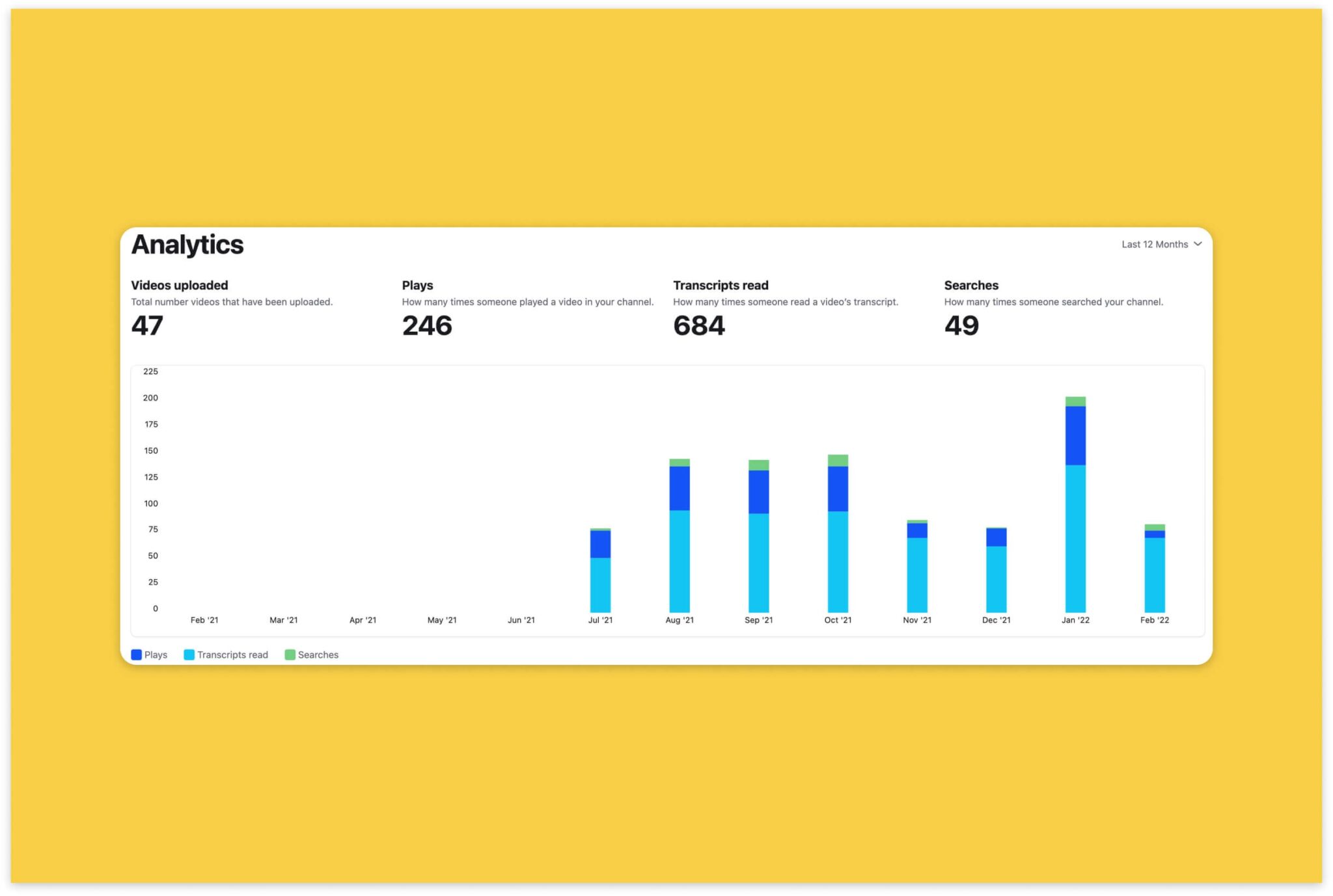
Video Platforms
Rewatch and tl;dv are both available for the same three video conferencing platforms: Zoom, MS Teams, and Google Meet.
Records Video
Recording video is second nature to both tools too. They don’t just transcribe calls but they also record them visually, capturing the full experience of the call. This means that when you hop between points on the transcript on either platform, you’ll be able to view the corresponding part of the call too. This is great for identifying body language in a rewatch.
Concurrent Meetings
tl;dv enables users to record concurrent meetings. If you’re scheduled to attend multiple meetings at the same time, you can send the AI transcriber to all scheduled calls simultaneously. This is fantastic for busy managers who frequently get CC’d into calls that they only really need to know the outcome of. Now, they’ll get a summary without needing to attend in the flesh.
Rewatch doesn’t allow users to record or transcribe multiple meetings at the same time. This is a big hindrance for those with busy schedules as they’ll be unable to take advantage of Rewatch’s conversational intelligence features for unattended meetings that run parallel to attended ones.
Download Recordings
Both tl;dv and Rewatch let users download recordings for local storage. This lets you export call recordings for you to manage privately.
Viewing Analytics
tl;dv has viewer analytics so you can keep track of how your meeting content is being consumed. How many people are rewatching calls, how many AI insights has your team gathered, and more. It helps ensure your team is making the most of the tool’s capabilities in their own recordings.
Rewatch offers similar analytics, including tracking plays, transcripts read, total searches, and even top searches. It also covers more specific metrics like average watch time that can help identify team members who are making the most of the recordings.
Reels
If you want to share snippets from multiple calls at once, condensed into a bite-sized video, you can! By using tl;dv, you can create clips from different transcripts about the topic you have in mind; feature requests, for example.
Once you’ve got several clips, you can make them into a reel and share it with your colleagues for further discussion. This means you don’t have to send them several separate transcripts with instructions about where to find the clip in question, and you don’t need to send them several separate clips either. One video with all the clips merged together hits two birds with one stone.
Rewatch doesn’t facilitate the making of reels.
Custom Bot Avatar
tl;dv encourages users to customize and personalize their bot avatars. You can rename the AI that joins the call and give it a new avatar image so that it isn’t so intimidating to other participants.
Rewatch doesn’t offer users the ability to customize their bot’s avatar.
Conversation Intelligence Capabilities
| tl;dv (14) | Rewatch (8) | |
|---|---|---|
| Single Meeting AI Insights | 🟢 | 🔴 |
| Multi Meeting AI Insights | 🟢 | 🔴 |
| Keyword tracking | 🟢 | 🟢 |
| Sentiment Analysis | 🔴 No, as per EU AI Act | 🔴 |
| Key Topic detection | 🟢 | 🟢 |
| Speech Analytics | 🟢 | 🔴 |
| Action item detection | 🟢 | 🟢 |
| Question detection | 🟢 | 🟢 |
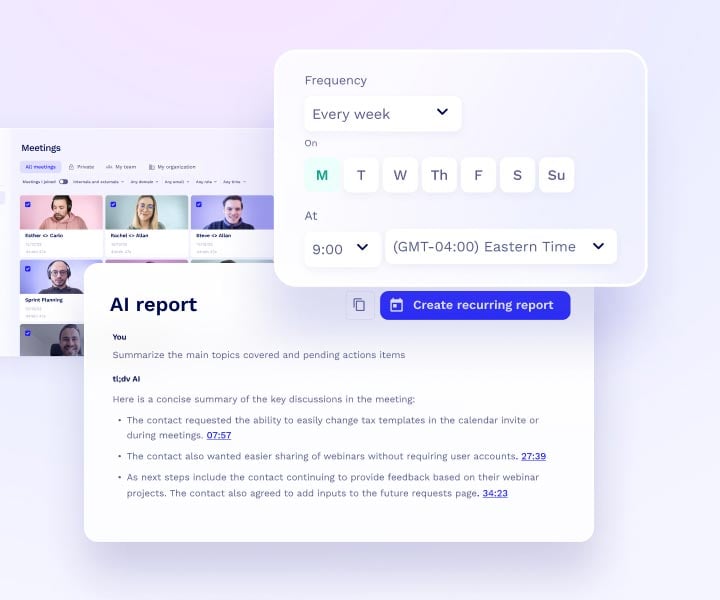

Single Meeting AI Insights
The “Ask tl;dv AI” feature empowers users to get specific and detailed insights into a single meeting. You can ask the generative AI questions about the meeting. For example, “list the reasons why this prospect wants to leave our competitor”. Not only will it create the list for you, it’ll also provide timestamps for you to hop through the call and rewatch it for yourself.
Rewatch doesn’t provide single meeting AI insights in the same way. It has AI notes and summaries, but you can’t get deeper insights from it than that.
Multi-Meeting AI Insights
Talking of deeper insights, tl;dv’s “ask tl;dv AI” feature isn’t just for single meetings. You can generate reports by filtering the meetings you want the AI to search and asking similar questions over a broader range of calls. For example, filter your sales calls, perhaps even specific sales reps, and ask something like: “What are the most common objections from prospects?” You’ll get a list with timestamps that take you directly to the most common objections. These kinds of insights are why tl;dv is an industry leader.
Rewatch doesn’t allow users to generate reports across multiple meetings simultaneously, hindering its ability to help you find trends, patterns, or deeper insights.
Keyword Tracking
Both tl;dv and Rewatch facilitate keyword tracking so that users can quickly and easily identify call moments of importance. With tl;dv, you can even schedule reports based on keywords to get AI insights automatically that cover a number of calls in one.
Rewatch enables users to subscribe to keywords and get notified whenever it’s been used in a video that you have access to.
Sentiment Analysis
Neither tl;dv nor Rewatch enable sentiment analysis. tl;dv is a German company. As such, it’s unable to offer sentiment analysis due to the EU AI Act.
Rewatch was founded in San Francisco, U.S.A, but has recently been acquired by the popular Australian company, Atlassian. Despite this, Rewatch does not have a sentiment analysis feature.
Key Topic Detection
Detecting key topics in your AI summaries is important for skimming and easily locating information. Both tools provide this feature so their AI notes can be broken down easily.
Speech Analytics
tl;dv’s speech analytics dashboard helps you identify how your sales team is performing by empowering sales managers to monitor things like monologue length, talk-to-listen ratio, filler words used, and more. It also lets users check how well sales reps have stuck to the playbooks you’re working from, and how they’ve handled objections.
Rewatch doesn’t provide any speaker analytics, highlighting a clear differentiator between the two platforms.
Action Item Detection
Both tl;dv and Rewatch provide action item detection in AI notes and summaries. This makes it super easy for users to find key takeaways, including next steps after a call.
Automation & Integration Capabilities
| tl;dv (9) | Rewatch (8) | |
|---|---|---|
| CRM Integrations | 🟢 | 🟢 |
| Email Integrations | 🟢 | 🟢 |
| Zapier Integrations | 🟠 in Pro plan | 🟢 |
| Post-Meeting summary email | 🟢 | 🟢 |
| Schedule Reports | 🟢 | 🔴 |
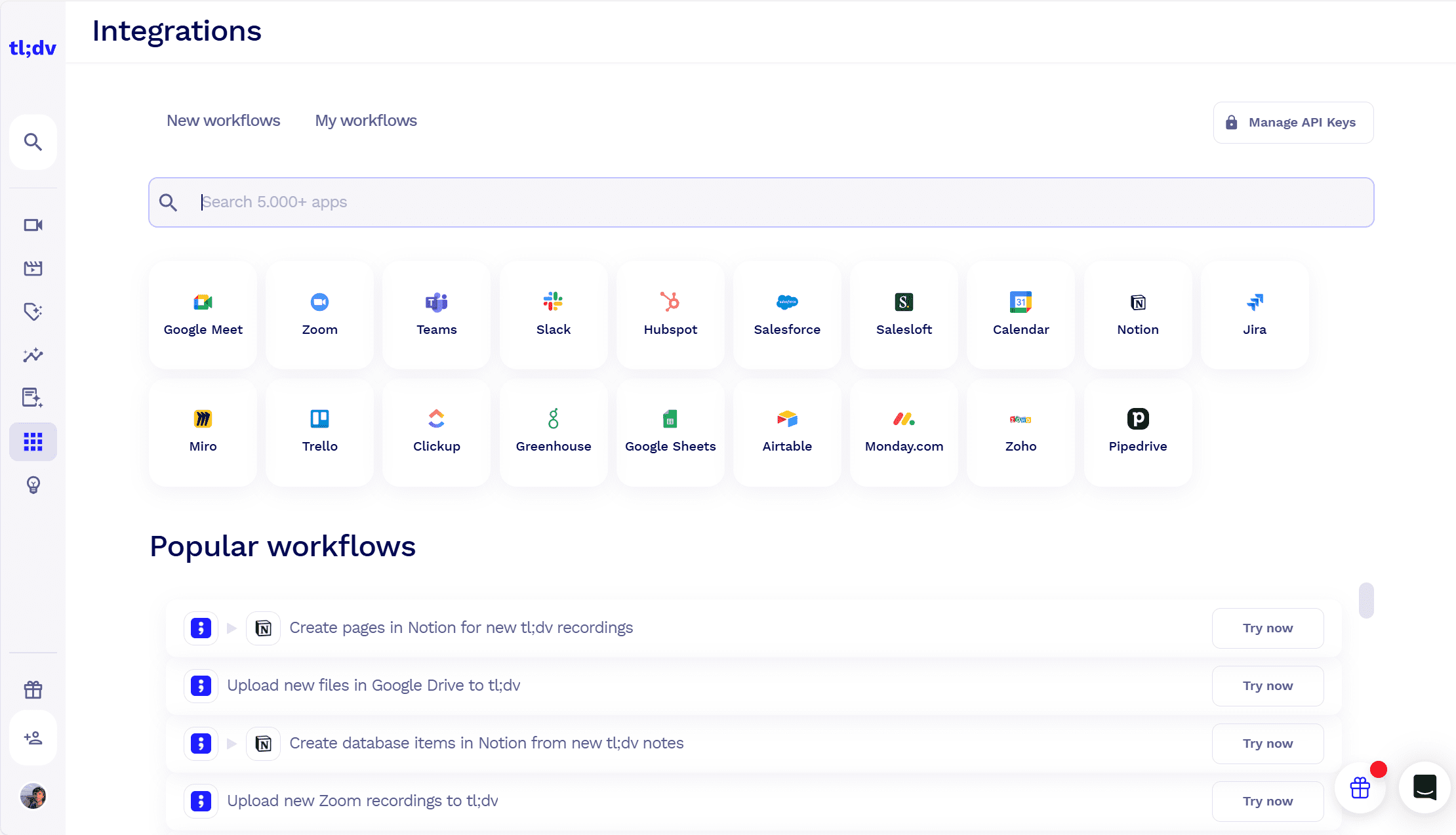
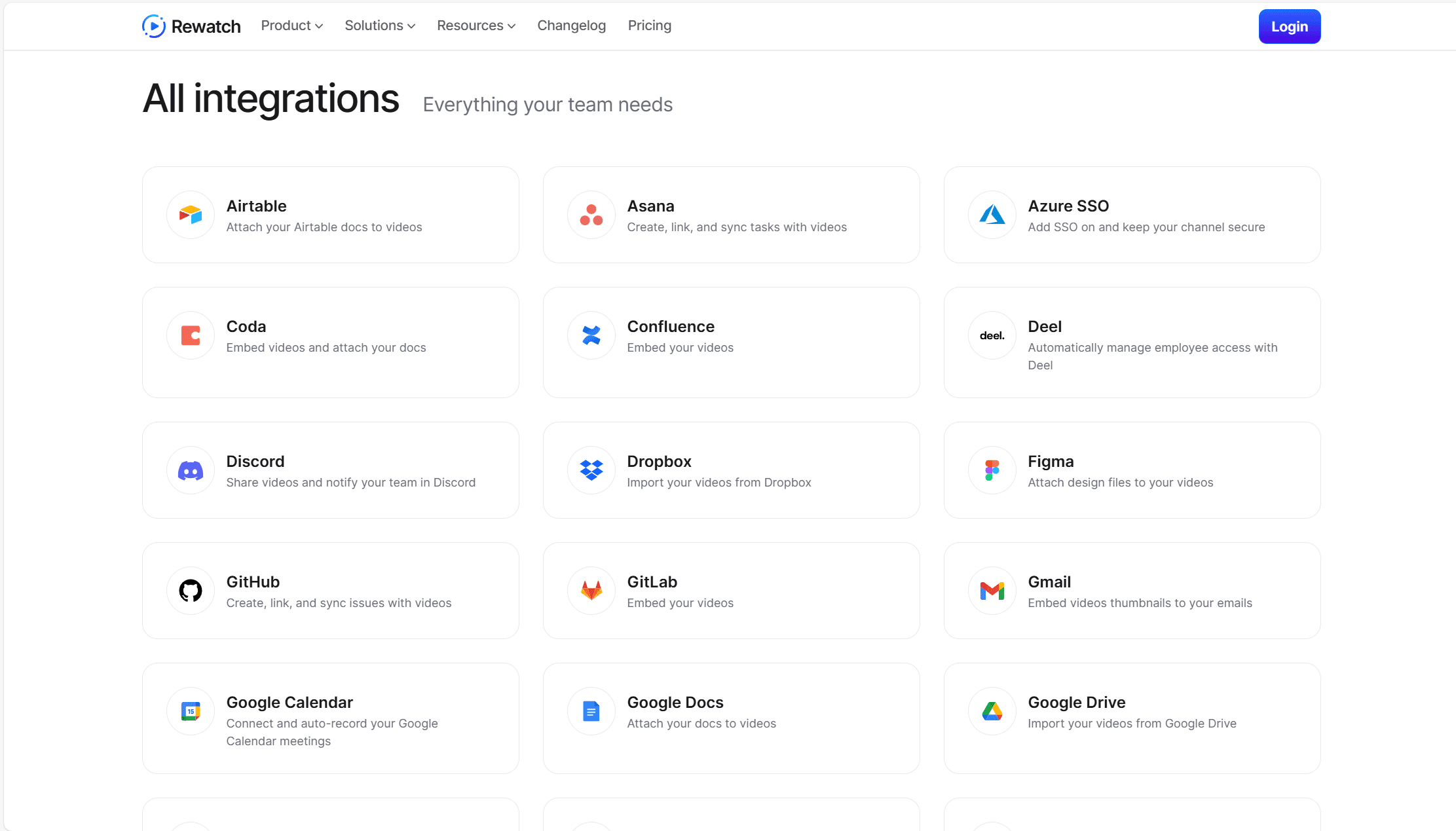
CRM Integrations
tl;dv offers numerous CRM integrations with all your favorite tools. From Salesforce to Hubspot, Zoho to Pipedrive, tl;dv integrates directly with a wide variety of CRMs so that you can seamlessly input meeting data. This feature is unlocked in the Pro Plan.
Rewatch offers CRM integrations for free, giving it the upper hand over tl;dv. However, it’s worth noting that Rewatch only provides integrations for 2 CRMs: Hubspot and Salesforce. This lack of choice may be a hindrance for teams using less popular CRMs.
Zapier Integrations
Both tl;dv and Rewatch integrate with Zapier so you can create no-code “zaps” with 5,000+ different work tools. However, Rewatch offers this free of charge, whereas it’s unlocked only in tl;dv’s Pro Plan. This gives Rewatch users a slight advantage in terms of trying out the tool’s automation features before committing to a subscription.
Post-Meeting Summary Email
Rewatch calls these “Meeting Recap Emails” and they’re sent to all invitees, even if the invitee never attended the meeting. This keeps all participants (and would-be participants) up to speed with everything discussed, all tasks assigned, and all action items noted.
tl;dv also provides post-meeting summary emails to all participants so everyone can have a central source of truth to hold each other accountable by. This simple email can resolve disputes that arise over miscommunication in mere moments.
Schedule Reports
The ability to schedule recurring reports and subscribe to specific topics is something that sets tl;dv apart from the competition. You can get multi-meeting reports about any topic you like at any frequency you like. For example, if you want to keep up to date on specific prospect objections, now you can. You’ll receive recurring reports, however frequently you wish, that cover all the meetings your team had within that time period. This can be narrowed down even further by selecting specific colleagues, internal or external meetings, and other filters.
The report will contain timestamps so you can jump between meetings to listen for yourself, but it’ll also provide a summary to let you know what’s been said about your topic of choice. The versatility of this feature makes it a stand-out success across the board. From sales teams to CS, product development to UX research, recurring reports are a manager’s best friend.
Rewatch does not offer the ability to schedule recurring reports.
Note-taking Capabilities
| tl;dv (12) | Rewatch (8) | |
|---|---|---|
| AI Notes | 🟢 | 🟢 |
| Manual notes during calls | 🟢 needs app | 🔴 |
| Tag people in notes | 🟢 | 🔴 |
| Assign tasks | 🔴 | 🔴 |
| AI Tags / Bookmarks | 🟢 | 🟢 |
| Comments | 🟢 | 🟢 |
| Custom Meeting Templates | 🟢 | 🟢 |
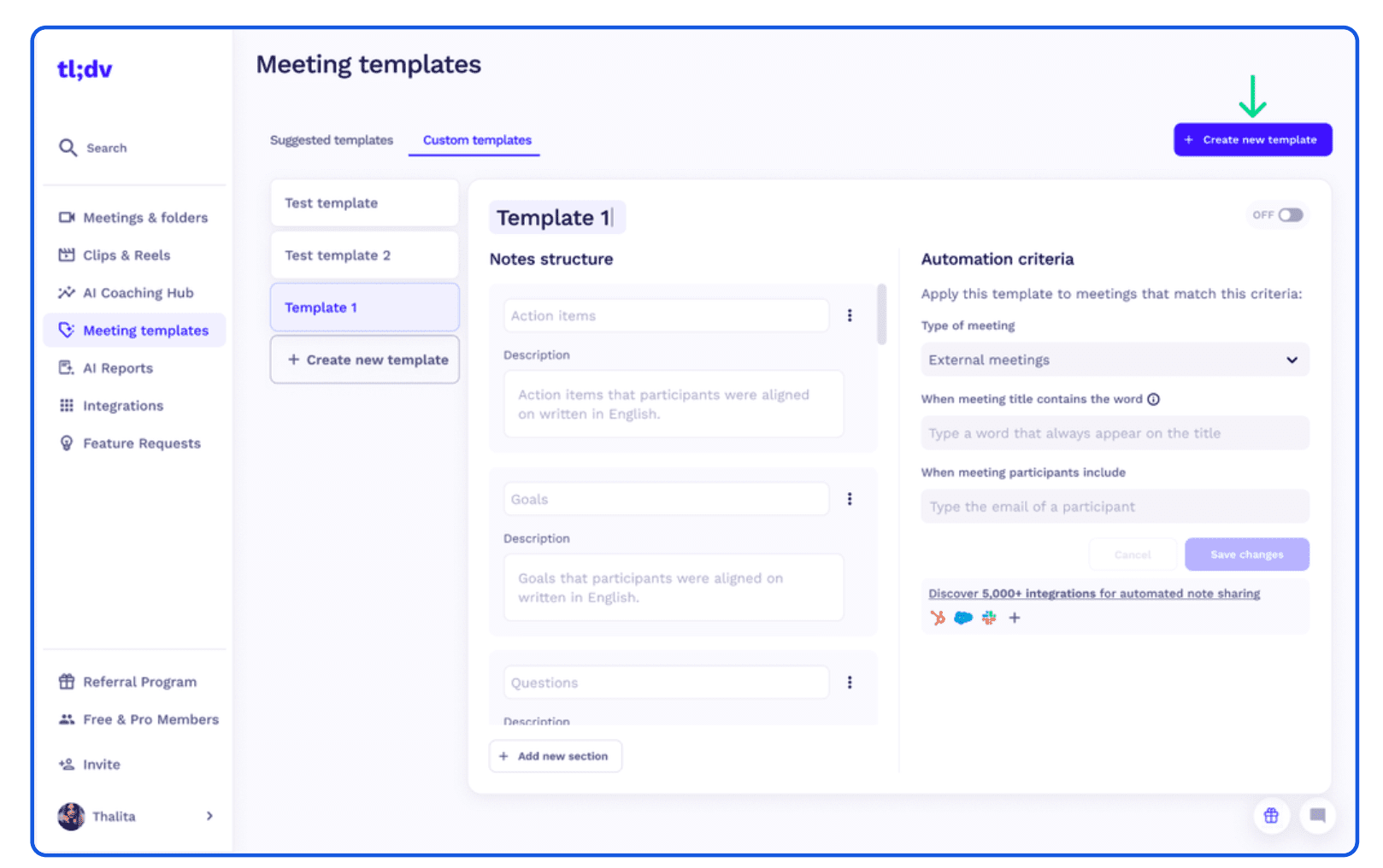
Manual Notes During Calls
tl;dv requires you to have the app to take manual notes, but then it’s simple. The AI will still generate notes on its own, but you get the freedom to jot things down that require context that the AI won’t have.
Rewatch offers AI notes but doesn’t provide any way for users to take notes manually. This can be a big drawback. While AI notes are a great step forward, they’re never going to be perfect. Manual notes are still important as a fallback and it’s a better user experience if there’s a way they can do it.
Tag People in Notes
If you want to tag people in notes, tl;dv allows this and can even create conversations in notes through comments.
Rewatch lacks collaboratively here as its users are unable to tag colleagues straight into the notes themselves.
Assign Tasks
Neither tl;dv nor Rewatch enable you to assign tasks to colleagues within the platform itself. However, both tools enable users to assign tasks via third-party integrations.
Custom Meeting Templates
Custom meeting templates are a great way to get more streamlined notes in the way that suits your team best. tl;dv specializes in this by empowering users to set up different templates for different types of calls. Not only are there a whole host of recommended templates, you can build your own from scratch and set filters for which meetings the AI needs to use the template for.
This means you can have your sales calls running off one custom template, your CS calls off another template, and your UX Research calls off a third template. It’s a versatile feature that allows you to get the most out of your AI meeting assistant.
You can take this a step further by mapping each section of your custom meeting notes template with a CRM field so that all your meeting notes will be synced automatically to the correct place in your CRM afterwards. This seamless automation can save your team countless hours.
Rewatch has recently upgraded from a generic summary to having the option to customize meeting note templates. Only channel administrators can create and edit meeting templates, but all users can apply them to their calls. Rewatch also offers some preset templates, but it provides the option to add prompts to these templates so that the AI answers more specific questions during its summary. These meeting templates can be applied to entire channels.
Security Capabilities
| tl;dv (19) | Rewatch (7) | |
|---|---|---|
| Data retention | 🟠 6 months on FREE plan. Unlimited on all paid plans | 🟠 Flexible (Enterprise only) |
| SOC2 Compliant | 🔴 (certification underway) | 🟢 |
| SAML-based SSO | 🟢 Only on Enterprise | 🟢 Only on Enterprise |
| GDPR Compliant | 🟢 | 🟢 |
| EU AI Act Compliant | 🟢 | 🔴 not disclosed |
| Uses your data to train AI | 🟢 (No, your data is kept private) | 🔴 not disclosed |
| Private storage | 🟢 Only on Enterprise | 🔴 not disclosed |
| Anonymized sensitive data sent to LLMs | 🟢 | 🔴 not disclosed |
| Meeting data chunking and randomizing | 🟢 | 🔴 not disclosed |
| BAA with LLM providers | 🟢 | 🔴 not disclosed |
| 0-day data retention policy with vendors | 🟢 | 🔴 not disclosed |
Data Retention
tl;dv offers 6 month free data retention so that users on the free plan can still use tl;dv’s recorder and have access to their recorded meetings. Once the user adopts a subscription, they’ll keep their recordings for as long as they’re a paid member.
Rewatch’s data retention policy is a little more flexible, but only at the Enterprise level. This helps users meet their security and privacy obligations, but only on the highest subscription tier.
SOC2 Compliant
SOC2 compliance is an important security measure that data-conscious users need to be aware of. Rewatch is SOC2 compliant, giving users peace of mind when using this product.
tl;dv is currently in the process of obtaining SOC2 certification. While it’s not there yet, the process is ongoing, marking a commitment to becoming more compliant and data-savvy.
SAML-based SSO
Both tl;dv and Rewatch offer support for SAML-based SSO in their Enterprise plans. This is great news for big businesses who want more security from their AI meeting assistant.
GDPR Compliant
tl;dv and Rewatch are both GDPR compliant. They follow the European Union’s strict regulations regarding data protection and privacy.
EU AI Act Compliant
As an EU-based company, tl;dv is compliant with the EU AI Act and follows stringent policies to keep AI under control.
Rewatch has not disclosed whether or not it complies to the EU AI Act.
Uses Your Data to Train AI
tl;dv will never use your data to train AI models. It also does not pass your data on for other companies to train AI. This is important for data privacy and security, but also for ethical reasons.
Again, Rewatch has not disclosed their policies concerning the training of AI. Whether or not they use customer data to train AI models is up in the air.
0-Day Data Retention Policy With Vendors
tl;dv maintains a 0-day data retention policy with vendors so they do not keep user data for any longer than is absolutely necessary: under one day.
Rewatch has not disclosed their data retention policy for vendors. It’s unknown how long third parties can keep data given to them by Rewatch.
Coaching Capabilities
| tl;dv (8) | Rewatch (0) | |
|---|---|---|
| Playbooks Scorecards | 🟢 | 🔴 |
| Custom Playbooks | 🟢 | 🔴 |
| Template Playbooks | 🟢 | 🔴 |
| Objection Handling | 🟢 | 🔴 |
tl;dv offers a comprehensive suite of coaching capabilities not available on Rewatch, including:
- Playbooks Scorecards: This allows for personalized performance tracking and development. Generate a playbook scorecard against any set of meetings to get detailed insights into sales team performance or even for self-coaching.
- Custom Playbooks: This lets users build their own playbooks or frameworks of proven meeting strategies. Whichever playbook you decide to create, you’ll be able to run it against any meeting (or set of meetings) by establishing clear criteria for when it should be used.
- Template Playbooks: These provide popular ready-made frameworks that teams can adapt to their coaching strategies.
- Product (Research Interview, User testing).
- Project (Sprint planning, Stand-up meeting, Brainstorming, Kick-off)
- HR (Job Interview, Exit Interview, Entry Interview).
- Customer Success (Retrospective meeting, Business Review, Customer onboarding meetings, Customer check-in meetings, Feedback call).
- Sales (Demo call, MEDDIC, SPICED, BANT, Discovery call, GPCT, CHAMP, ANUM, BEBEDC, SPIN).
- Management (Performance Improvement Plan, 1:1 meeting, Offboarding 1:1, Performance Review).
- Objection Handling: This equips Sales and CS teams with performance scorecards on their objection-handling technique, driving improvement through actionable insights.
Admin Capabilities
| tl;dv (8) | Rewatch (6) | |
|---|---|---|
| Apply auto-record of all meetings in the team members’ calendar | 🟢 | 🟢 |
| Apply auto-share of meetings recorded by team members | 🟢 | 🟢 |
| Prevent Deletion | 🟢 | 🔴 |
| Admin rights over all recordings | 🟢 | 🟢 |
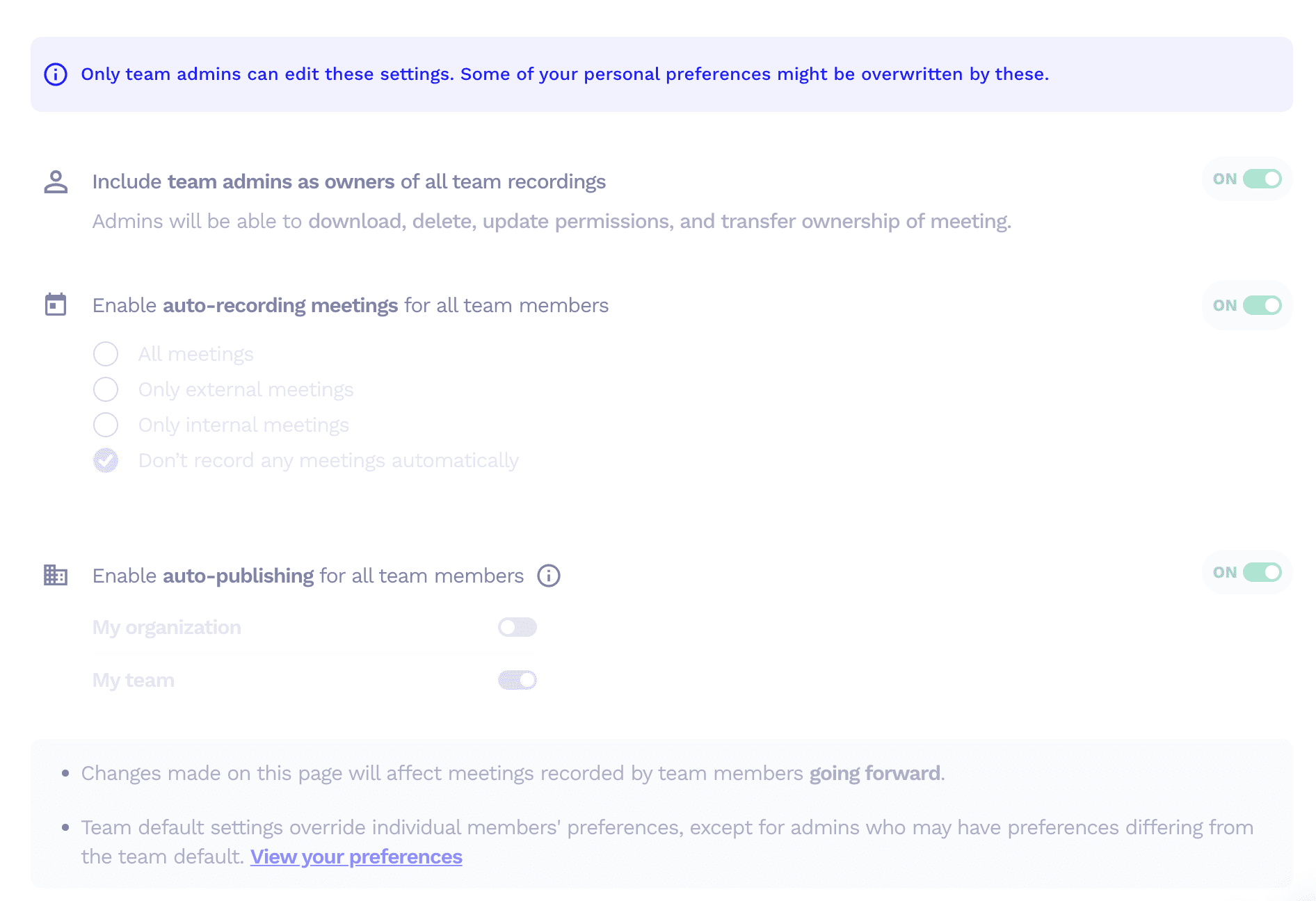
Apply Auto-Record of All Meetings in the Team Members’ Calendar
tl;dv empowers admins with the ability to auto-record all meetings directly from their team members’ calendars. This means that an admin can auto record meetings that they aren’t even invited to.
Rewatch users can do something similar, though only within a given channel. Channel administrators can control the record settings of all meetings from that channel, but not outside of it.
Apply Auto-Share of Meetings Recorded by Team Members
Similarly, tl;dv lets admins auto-share meetings recorded (and owned) by team members. This is a handy feature for managers who need instant access to their team’s meetings.
Rewatch also enables channel administrators to auto-share meetings from that channel with specific people.
Prevent Deletion
Admins in tl;dv can prevent their team from deleting meetings. This might not seem overwhelmingly useful at first glance, but it can be huge in maintaining organization within your company. It can prevent malicious actors from deleting incriminating evidence, but it can also ensure managers are getting accurate representations of their team’s overall work. For example, if you’re getting speaker analytics from your sales team, but the sales reps are deleting calls that didn’t go well (either voluntarily or accidentally) then the results will be skewed to reflect that. Preventing deletion is of vital importance for managers.
Rewatch doesn’t offer the ability for admins to prevent team members from deleting call recordings.
Organizational Capabilities
| tl;dv (12) | Rewatch (12) | |
|---|---|---|
| Team Workspaces | 🟢 | 🟢 |
| Meetings Library | 🟢 | 🟢 |
| Smart Filters | 🟢 | 🟢 |
| Global Search | 🟢 | 🟢 |
| Search within meetings | 🟢 | 🟢 |
| Folders | 🟢 | 🟢 |
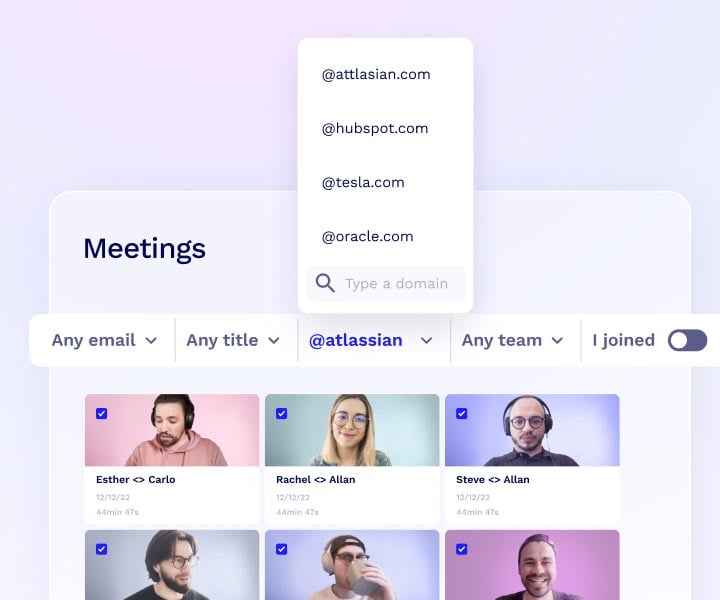
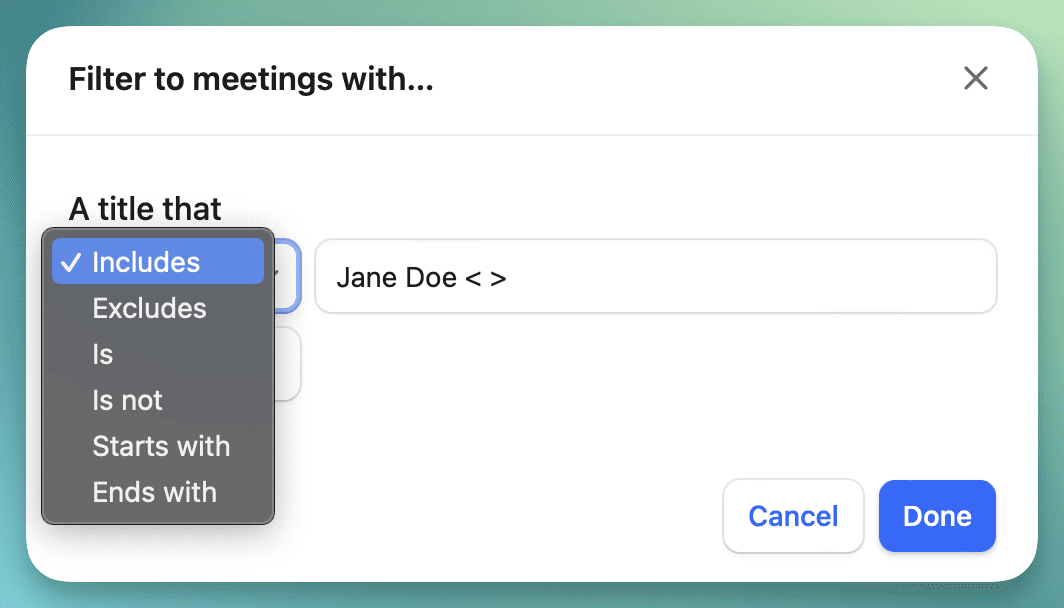
Both tl;dv and Rewatch are equally matched here. Both platforms make it easy for you to organize your meetings. Whether you want to keep them in your meetings library or file them into folders, the choice is yours.
You can search directly within the meeting transcript using either of these tools, and you can also do a global search across all your meetings at once. This is where tags, bookmarks, and keywords come in handy.
tl;dv and Rewatch both enable you to use smart filters to quickly and easily find what you’re looking for.
Support Capabilities
| tl;dv (4) | Rewatch (3) | |
|---|---|---|
| Support in Free Plan | 🟢 chat & email | 🟠 email in Free plan |
| Priority Support | 🟢 in Pro plan | 🟢 in Team and above |
Support in Free Plan
tl;dv offers chat and email support for its free users, giving everybody two clear ways to get assistance.
Rewatch only enables email support for free users which can lead to longer wait times.
Priority Support
tl;dv provides priority support for all paid users, making sure getting help is quick and stress-free.
Rewatch provides a prioritized email for Team subscribers, allowing them to “jump the queue” in support queries. For Enterprise users, businesses get a dedicated rep to maintain relations with and get support from at any time.
Revenue Intelligence Capabilities
| tl;dv (0) | Rewatch (0) | |
|---|---|---|
| Forecasting | 🔴 | 🔴 |
| Deal execution | 🔴 | 🔴 |
Neither of these two platforms provides any revenue intelligence features, making them subpar choices for teams that are prioritizing revenue intelligence, pipeline management, and deal forecasting.
Both tl;dv and Rewatch are built with SMB Sales teams in mind, though both tools can also work across the board. From Product Design to Customer Success, these two platforms are great for recording, transcribing, and even translating meetings both internally and externally.
However, tl;dv gets a higher rating (from more reviewers) on G2, emphasizing the tool’s ability to go above and beyond what’s expected of an AI meeting assistant.
Additionally, tl;dv provides a localized platform in 7 different languages. This localized platform doesn’t just translate the text, but considers the culture, market, and user experience in the countries it targets. This makes tl;dv an excellent choice for international teams or multinational enterprises. Rewatch does not have a localized platform for any foreign markets.
Finally, tl;dv has a freemium plan that provides unlimited call recordings, transcriptions, translations, and even a bunch of AI features and limited integrations that you can get started with without spending a penny. This means you can get a real feel for the tool before committing to a purchase. Rewatch also has a free plan available, though it’s rather limited with just 15 transcriptions per month. Rewatch’s free plan does, however, provide access to all its integrations.
The real drawback of Rewatch in terms of setting up right now is that it’s becoming a part of Atlassian. During the takeover, Rewatch is not accepting new sign ups. This brings the ease of setting up to impossible.
Verdict: tl;dv vs Rewatch – Which One Is the Best?
| tl;dv | Rewatch | |
|---|---|---|
| Transcription | 19 🟢 | 18 |
| Recording | 20 🟢 | 14 |
| Conversational Intelligence | 14 🟢 | 8 |
| Automation & Integrations | 9 🟢 | 8 |
| Note-taking | 12 🟢 | 8 |
| Security | 19 🟢 | 7 |
| Coaching | 8 🟢 | 0 |
| Admin | 8 🟢 | 6 |
| Organizational | 12 | 12 |
| Support | 4 🟢 | 3 |
| Revenue Intelligence | 0 | 0 |
| Other | 6 🟢 | 2 |
| Total | 131 🟢 | 86 |
While tl;dv wins on paper, it ultimately comes down to your business needs. For example, if you already have a Loom subscription, Rewatch could very well be slotting into that subscription without an additional fee soon (though this is yet to be seen). This type of technicality can create a big difference in how you see the results.
However, if you’re in any way inclined to use your AI meeting assistant to make more sales, then tl;dv is the standout choice here. And it’s not even close.
Rewatch doesn’t have any sales coaching features, nor multi-meeting intelligence. These two areas are where tl;dv shines as it allows them to stand head and shoulders above the competition.
Its wealth of playbooks are great for sales coaching, whether self-learning or with a dedicated sales coach. The speaker analytics dashboard provides plenty of insights into your team’s sales performance and how to improve it. And the recurring reports feature makes a manager way more efficient.
Additionally, tl;dv’s transcription, recording, and note-taking capabilities all surpass that of Rewatch’s, further emphasized by tl;dv’s higher G2 rating. Having said that, Rewatch provides custom vocabulary which can be vital in certain industries. It’s also already SOC2 compliant whereas tl;dv is still in the process of obtaining certification.
To summarize, the final thing to consider in this tl;dv vs Rewatch comparison is your specific business needs. And whichever platform you opt to go for, you’re making big strides towards efficiency. Good luck.

